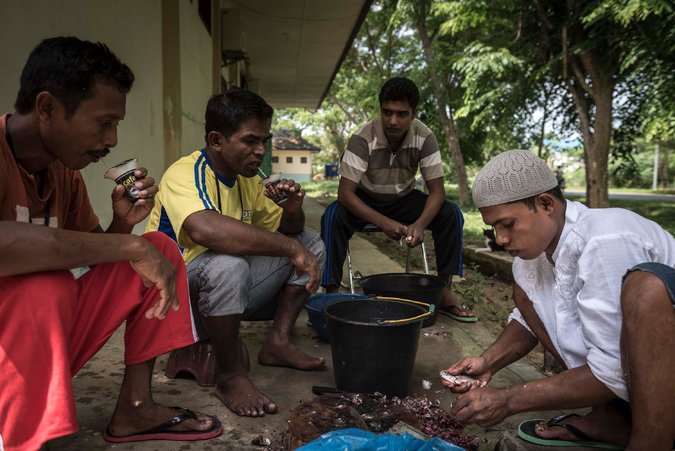When they embraced democracy and vowed to leave behind their repressive and dictatorial past, the leaders of Myanmar enjoyed a honeymoon of praise and admiration from luminaries across the globe.
But the country’s harsh treatment of its Rohingya Muslim minority, setting off an exodus of people by boat across Southeast Asia, has unleashed a barrage of criticism in recent days aimed not only at the country’s former generals but also at the leader of Myanmar’s democracy movement, the Nobel laureate Daw Aung San Suu Kyi.
The Dalai Lama, the Tibetan Buddhist spiritual leader and a fellow Nobel Peace Prize winner, was quoted on Thursday in an Australian newspaper as saying that Ms. Aung San Suu Kyi should be helping to address the plight of the Rohingya, who number more than a million but are not recognized as citizens of Myanmar, are restricted in their travels and suffer persecution and deprivation.
“I met her two times, first in London and then the Czech Republic,” the Dalai Lama told The Australian. “I mentioned about this problem and she told me she found some difficulties, that things were not simple but very complicated.”
About 25,000 migrants left Myanmar and Bangladesh on rickety smugglers’ boats in the first three months of 2015, according to a United Nations estimate.

“But in spite of that I feel she can do something,” he added.
The Rohingya are widely reviled in Myanmar, which is overwhelmingly Buddhist and has an influential radical Buddhist political movement. Speaking out for the Rohingya is seen as a form of political kryptonite for any Buddhist politician like Ms. Aung San Suu Kyi.
Ms. Aung San Suu Kyi has offered various explanations in recent years for her reluctance to speak out for the Rohingya, saying at one point that a public airing of her views could further stoke the fires of radical Buddhists, who have ransacked Rohingya villages, displacing more than 100,000 Rohingya.
Jonah Fisher, a BBC correspondent in Yangon, said in a Twitter post on Thursday that Ms. Aung San Suu Kyi’s latest statement on the Rohingya was that it was the government’s duty to solve the issue.
Her critics have said that someone of her enormous moral authority in Myanmar should take a stronger stance.
Archbishop Desmond Tutu of South Africa, another winner of the Nobel Peace Prize, said in a recorded message aired this week that aid donors, including the European Union, should make their funding for the impoverished country “conditional on the restoration of citizenship, nationality and basic human rights to the Rohingya.”
“A country that is not at peace with itself, that fails to acknowledge and protect the dignity and worth of all its people, is not a free country,” Archbishop Tutu said in remarks that were broadcast at a conference on the Rohingya in Oslo this week.
He said he agreed with those who say a “slow genocide” was being committed against the Rohingya.
Myanmar and its neighbors see the people of the Rohingya ethnic group and the seaborne trafficking of migrants in the region very differently, complicating the refugees’ plight.

At the same conference, George Soros, the financier and philanthropist who for more than two decades has been active in promoting democracy, sent a videotaped speech in which he said he was “growing discouraged” by developments in Myanmar.
“The most immediate threat to Burma’s transition is the rising anti-Muslim sentiment and officially condoned abuse of the Rohingya people,” he said.
Mr. Soros said he visited a Rohingya settlement in January and saw parallels to his youth as a Jew in Nazi-occupied Europe.
“You see, in 1944, as a Jew in Budapest, I too was a Rohingya,” he said.
The Rohingya settlement was a ghetto, he said, an “involuntary home to thousands of families who once had access to health care, education and employment.”
“Now, they are forced to remain segregated in a state of abject deprivation. The parallels to the Nazi genocide are alarming.”
Myanmar officials are scheduled to meet with their counterparts from other Asian countries in Bangkok on Friday for a meeting to address migrants, chief among them the Rohingya, who have been fleeing Myanmar by the thousands.
Myanmar, which changed its name from Burma during the previous military dictatorship and lashes out at governments that continue to refer to the country as Burma, refuses to recognize the term Rohingya and calls the people Bengali instead, suggesting that they come from neighboring Bangladesh.
Officials in Myanmar said they would not attend the government meeting in Thailand if the term Rohingya were used.
Thailand, which has been reluctant to anger its neighbor, agreed to Myanmar’s demands and titled the conference Special Meeting on Irregular Migration in the Indian Ocean.
Source: NYTimes








